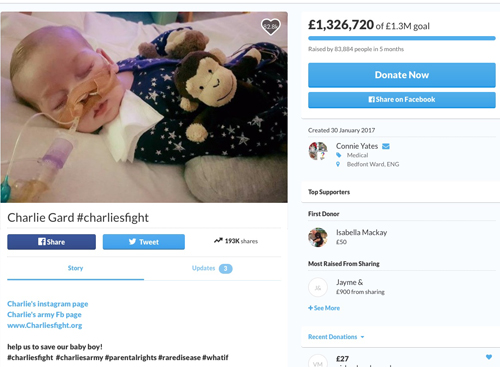
Reflecting on the case of 11-month-old British baby Charlie Gard which has provoked headlines around the world this week, MAL FLETCHER argues that the outcome should have a bias toward preserving life…
London
The case of 11-month-old British baby Charlie Gard represents an important opportunity for reflection on the ethics of life sciences and protecting the vulnerable.
The question British courts have faced is whether or not it would be more injurious to the child, to have hospital life-support removed – against the wishes of his parents – or to be flown to the US for an experimental treatment, which has never been tried on such a case.

Image of the Charlie Gard Go Fund Me page.
“The bias, if there is one, should be on the side of preserving life, while preventing any definite signs of unnecessary suffering. Once we turn from this principle, we open ourselves to utilitarianism – the idea that we should always, first and foremost, promote the highest good for the greatest number of people.”
Charlie is only the 16th person in the world to suffer with this condition. He cannot move or utter sound and doctors believe he has suffered significant brain damage.
In recent weeks, the Pope and President Trump have offered support for Charlie’s parents.
Yesterday, another US hospital offered to admit Charlie or, if Great Ormond Street hospital approves, to fly their drug to Britain with instructions on how it is to be administered.
In considering Charlie’s case, the courts faced an unenviable decision. There is a clear responsibility to protect the child from suffering.
However, because Charlie’s condition is so rare there is no definitive evidence that the original treatment offered in the US would cause him further harm. Of course, there is also no evidence that it will add to his life expentancy or quality of life.
In the absence of evidence either way and despite the fact that Great Ormond Street has an excellent history, the parents should be allowed to try every reasonable measure to prolong their son’s life.
As things stand – and we must rely on the information given via the media – it doesn’t appear that every reasonable opportunity has yet been exhausted.
The bias, if there is one, should be on the side of preserving life, while preventing any definite signs of unnecessary suffering.
Once we turn from this principle, we open ourselves to utilitarianism – the idea that we should always, first and foremost, promote the highest good for the greatest number of people.
This principle, though often seen as a default in politics and sometimes in medicine, has limitations. A truly humane society will also focus on the rights of the individual – in this case, the rights of Charlie and his primary carers, who are not the courts but his parents.
No-one should suggest that either the courts or the hospital involved in this case are lacking in compassion. They clearly are not. However, the principle of care for the individual – and the rights of parents to oversee their child’s care, unless obviously injuring the child – should be upheld.
It seems that much is unknown about the condition which has brought about little Charlie’s predicament. Some leeway should be granted for any attempt to improve his lot, even if it has only a slim possibility of success.

Mal Fletcher is a social futurist, social commentator and speaker and the chairman of 2020Plus, a London-based think tank. He has researched global social trends for more than 25 years and speaks to civic leaders worldwide about issues relating to socio-cultural ethics & values, PESTLE Analysis, civic leadership, emerging and future technologies, social media, generational change and innovation. First published at 2020Plus.net. Copyright Mal Fletcher, 2017.





